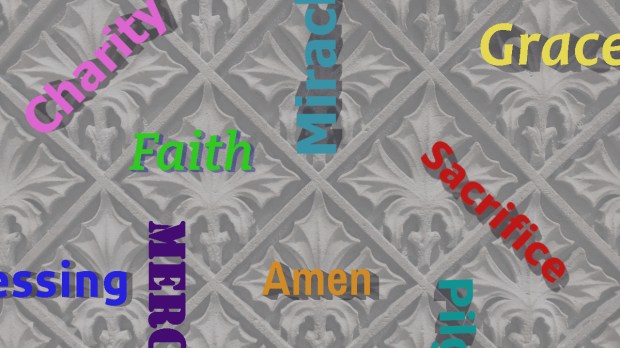One of the beauties of languages is how very rich and adaptable they are, developing from events and cultures in life in general. While many Catholic and Judeo-Christian terms are specific to religious contexts, some have made their way into everyday speech.
Here are just some words or phrases meaningful to Catholics that are also commonly used in general conversation. They reflect the influence of Catholicism and the Judeo-Christian tradition on culture and society:
Amen
This religious term you’re so familiar with comes from the Hebrew meaning “so be it” or “truly.” It is commonly used to affirm or conclude prayers, and in everyday speech, it can be used to express agreement or approval outside of a religious context.
Grace
In Catholicism, grace refers to the free and unmerited favor of God. When we use this term more generically, it can refer to elegance or politeness, as in “she moved with grace.”
Blessing
In a religious context, a blessing is a prayer asking for God’s favor and protection. It can also mean an act of praising, as in the Psalms. As the Catechism explains, “Every blessing praises God and prays for his gifts. In Christ, Christians are blessed by God the Father ‘with every spiritual blessing.’ This is why the Church imparts blessings by invoking the name of Jesus, usually while making the holy sign of the cross of Christ.”
In everyday speech, blessing can refer to a wish or prayer for someone’s well-being, such as saying “bless you” after a sneeze.
Charity
In the Catholic faith, charity is the theological virtue of love for God and neighbor. However, in everyday speech, it refers to acts of kindness, generosity, and helping those in need.
Sacrifice
In Catholic theology, a sacrifice is an offering made to God, and of course Jesus’ sacrifice on the cross earned salvation for us. Yet, in everyday speech, it can refer to giving up something for a greater purpose or for the benefit of others. So commonly people may say they sacrifice their time for their children.
Confession
In the Catholic Sacrament of Reconciliation, confession is the act of telling one’s sins to a priest. In everyday speech, it can refer to admitting a fault or wrongdoing. And in fact we often make confessions far from the confessional. You might admit to something in a hushed voice that you’re not overly proud of to a friend — for example, eating your children’s Halloween candy .
Miracle
Catholic tradition defines a miracle as an extraordinary event attributed to divine intervention. In regular speech, it can refer to any highly improbable or extraordinary event. Just think how many times you might have felt it’s a miracle when your kids have tidied their room!
Fasting
In Catholic practice, fasting involves abstaining from certain foods or meals as an act of penance or spiritual discipline. However, when we use the term in everyday life, it can refer to abstaining from something for a period of time. As you’ll have seen, some nutritionists champion fasting as a means to stay in shape.
Faith
In Catholicism, faith is a theological virtue involving belief in God and acceptance of His revealed truths. It is the cornerstone of our religion. But in regular conversations, faith can refer to belief or trust in something without necessarily requiring religious connotation.
Inspiration
Interestingly, in Catholic theology, inspiration refers to the guidance of the Holy Spirit in the writing of Scripture and in His guidance of us. It’s a term we’re all so familiar with in our everyday speech, where it can refer to being motivated or influenced to do something creative or meaningful.
Sanctuary
In a Catholic church, the sanctuary is the area around the altar where the Eucharistic liturgy takes place. For something so sacred it is therefore appropriate that it can also refer to a place of refuge or safety in everyday life — something many Catholics feel they receive in their faith with God.
Mercy
In Catholicism, mercy is the compassionate treatment of those in distress, and it is something we’re all called to practice, even with those who’ve harmed us. In everyday speech, it can refer to showing compassion, forgiveness, or leniency.
Good Samaritan
This term comes from the familiar parable in the Bible where a Samaritan helps a wounded stranger. If you hear someone being called a Good Samaritan outside of a religious context, then they are someone who selflessly helps others in need.
Pilgrimage
In Catholicism, a pilgrimage is a journey to a holy place for spiritual purposes. In everyday speech, it can refer to any journey or expedition, often with a sense of significance or purpose.



